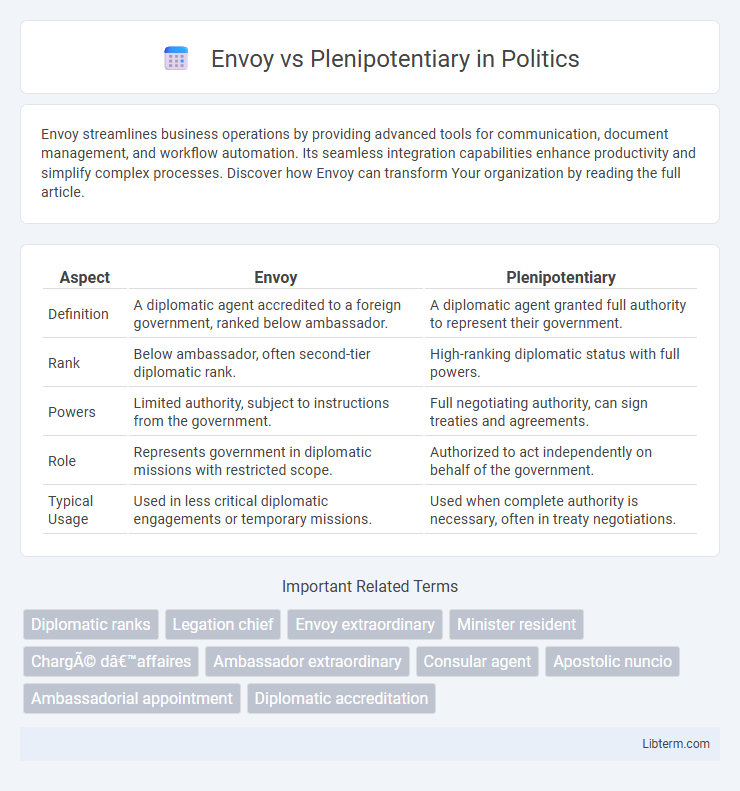Envoy streamlines business operations by providing advanced tools for communication, document management, and workflow automation. Its seamless integration capabilities enhance productivity and simplify complex processes. Discover how Envoy can transform Your organization by reading the full article.
Table of Comparison
| Aspect | Envoy | Plenipotentiary |
|---|---|---|
| Definition | A diplomatic agent accredited to a foreign government, ranked below ambassador. | A diplomatic agent granted full authority to represent their government. |
| Rank | Below ambassador, often second-tier diplomatic rank. | High-ranking diplomatic status with full powers. |
| Powers | Limited authority, subject to instructions from the government. | Full negotiating authority, can sign treaties and agreements. |
| Role | Represents government in diplomatic missions with restricted scope. | Authorized to act independently on behalf of the government. |
| Typical Usage | Used in less critical diplomatic engagements or temporary missions. | Used when complete authority is necessary, often in treaty negotiations. |
Introduction to Diplomatic Ranks
Envoy and Plenipotentiary are distinct diplomatic ranks that represent different levels of authority and responsibility in international relations. An Envoy typically serves as a diplomatic agent with limited powers, often ranked below an ambassador, while a Plenipotentiary holds full authority to act on behalf of their government, authorized to negotiate and sign treaties. Understanding the hierarchy of diplomatic ranks clarifies the roles and capacities entrusted to Envoys and Plenipotentiaries in formal diplomatic communications.
Defining Envoy: Roles and Responsibilities
An envoy is a diplomatic agent sent by a government to represent its interests, typically tasked with negotiation, conveying messages, and maintaining diplomatic relations in foreign countries. Envoys operate under specific instructions from their home government, carrying limited authority compared to ambassadors or plenipotentiaries, and often handle specialized or temporary missions. Their responsibilities include gathering intelligence, reporting on political developments, and facilitating communication between states.
Who Is a Plenipotentiary? Key Functions Explained
A plenipotentiary is a diplomat granted full authority to represent and act on behalf of their government, often empowered to negotiate and sign treaties independently. Key functions of a plenipotentiary include conducting high-level diplomatic negotiations, making binding decisions for their state, and managing critical international relations. Unlike an envoy, a plenipotentiary holds broader powers, enabling direct and authoritative actions in foreign affairs.
Historical Evolution of Envoys and Plenipotentiaries
Envoys and plenipotentiaries evolved as pivotal diplomatic ranks during the 17th and 18th centuries, reflecting shifts in international relations and state sovereignty. Envoys, originally dispatched for specific missions, gradually assumed broader responsibilities, while plenipotentiaries gained authority to negotiate and sign treaties on behalf of sovereign rulers. This historical evolution underscored the growing complexity of diplomacy and the need for empowered representatives to manage increasingly intricate political alliances and conflicts.
Legal Authority: Envoy vs Plenipotentiary
Envoys possess limited legal authority, acting primarily as diplomatic representatives with restricted powers to negotiate or sign treaties on behalf of their government. Plenipotentiaries, by contrast, hold full legal authority to negotiate, conclude, and sign international agreements independently, reflecting their comprehensive mandate. This distinction in legal authority fundamentally defines the scope and impact of their diplomatic roles in international relations.
Appointment Processes and Protocols
Envoys are diplomatic agents appointed by a head of state or government through a formal nomination process, often requiring approval from legislative bodies, and operate under established diplomatic protocols specific to their mission. Plenipotentiaries receive their appointments via official instruments known as letters of credence, granting them full authority to represent their government in negotiations or treaty signings, following strict ceremonial protocols upon presentation to the host country's head of state. Both roles require adherence to international diplomatic conventions, but plenipotentiaries hold broader negotiation powers formalized through their credentialing process.
Modern Relevance in International Relations
Envoys and plenipotentiaries remain critical in contemporary diplomacy, with plenipotentiaries holding full authority to negotiate and sign treaties on behalf of their states, ensuring swift and decisive international agreements. Envoys typically serve as special diplomatic agents with limited mandates, facilitating communication and representing their countries in specific negotiations or missions. The modern relevance of these roles lies in their ability to adapt to complex geopolitical dynamics, enabling states to manage nuanced diplomatic engagements effectively.
Case Studies: Envoys and Plenipotentiaries in Practice
Envoys and plenipotentiaries have played pivotal roles in diplomatic history, with notable case studies illustrating their distinct functions. Envoys often handled specific negotiations, such as the 1954 Geneva Conference where envoys from multiple nations negotiated peace terms, while plenipotentiaries, vested with full authority, shaped critical treaties like the Treaty of Versailles in 1919. These examples underscore plenipotentiaries' comprehensive mandate versus envoys' targeted diplomatic missions, highlighting their complementary roles in international relations.
Impact on Diplomacy and Negotiations
Envoys facilitate diplomatic communication by representing their home country in routine discussions, ensuring steady dialogue and trust-building. Plenipotentiaries hold extensive negotiating power, enabling them to make binding decisions and sign treaties on behalf of their government, thus accelerating diplomatic resolutions. The distinction significantly impacts negotiation dynamics, with plenipotentiaries shaping high-stakes agreements and envoys maintaining ongoing diplomatic relations.
Conclusion: Deciding Between Envoy and Plenipotentiary
Choosing between envoy and plenipotentiary depends on the scope of diplomatic authority required. Envoys generally represent their government with limited powers, suitable for specific negotiations or assignments, while plenipotentiaries carry full authority to negotiate and sign treaties, making them ideal for comprehensive diplomatic tasks. Evaluating the complexity of the diplomatic mission and the level of decision-making autonomy needed helps determine the appropriate designation.
Envoy Infographic

 libterm.com
libterm.com